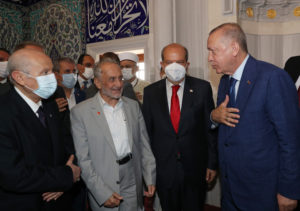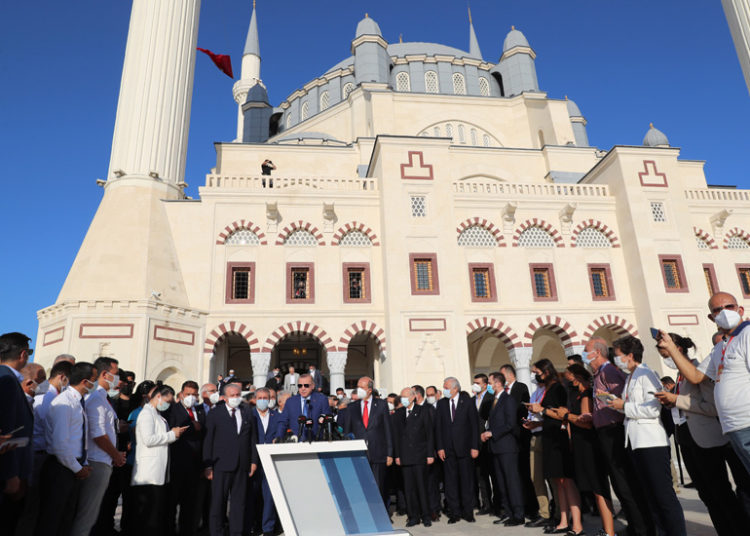Abdullah Bozkurt / Stockholm
A recent agreement between Turkey and northern Cyprus has raised concerns about a new push for historical revisionism with a blend of Turkish nationalism and political Islam, a review of the text of the accord has suggested.
According to the agreement, a copy of which was obtained by Nordic Monitor, Turkey and the Turkish Republic of Northern Cyprus (KKTC) agreed to launch an initiative to promote research on the history of education on the island during the pre-Ottoman, Ottoman and modern Turkish Republican periods.
Article 14 of the agreement, available only in Turkish, states that “the Parties will make efforts to mutually organize academic meetings and to prepare and publish scientific publications by experts in order to scientifically research the history of Cyprus education in the pre-Ottoman Period, the Ottoman period and the period of the Republic of Turkey.”
The text raised concerns among some in the opposition in Turkey as to whether the Islamist government of President Recep Tayyip Erdoğan and his nationalist and neo-nationalist allies had embarked on historical revisionism in Cyprus.
“I could not understand exactly what was intended from the cooperation in Article 14,” commented Ahmet Ünal Çeviköz, a lawmaker from the main opposition Republican People’s Party (CHP) and a former diplomat, during deliberations on the text of the agreement in the parliamentary Foreign Relations Committee on November 30.
“I mean, there seems to be an effort to rewrite history here,” he warned.
Text of the agreement on cultural cooperation between Turkey and the Turkish Republic of Northern Cyprus:
The agreement was signed in Ankara on February 13, 2020 by KKTC Minister of Education and Culture Nazim Cavusoglu and Turkish Culture and Tourism Minister Mehmet Nuri Ersoy. It is valid for five years with an automatic renewal of another five year-term.
It is no secret that President Erdoğan wants to promote his firebrand political Islamist ideology on the northern Turkish side of the island, with funds from Turkey diverted to build mosques, hire more Imams and support organizations that are allies of the Erdoğan government.
The agreement also includes an article stipulating use of the Yunus Emre Institute (YEI), the Turkish government’s cultural propaganda arm, for the promotion of Turkish Cypriots around the world. Turkey has established 64 YEIs in 53 countries and uses embassies and consulates to fill the void in countries where the YEI does not have a branch.
The provision prompted criticism from the opposition about why the Turkish government is employing its own cultural institute to promote the KKTC when it is supposed to be treating the KKTC as an independent state.

In reality the KKTC is subordinate to the Turkish government, which funds the Turkish Cypriot government and maintains thousands of troops on the island. In many cases Ankara runs intelligence and military operations on the island without even bothering to inform the locals.
Turkey interfered in the 2020 presidential election in the KKTC in order to curb the influence of people and organizations that oppose it, with Turkish government operatives threatening candidates running against the Turkish-backed candidate, Ersin Tatar.
Tatar, a nationalist, supports closer ties with Turkey and advocates a two-state solution on the island. He won the election with 51.69 percent of the vote, ousting the incumbent Mustafa Akıncı, a left-wing politician who wanted to resume peace talks with Cyprus’s internationally recognized Greek government.
Akıncı claimed that a team from Turkey’s National Intelligence Organization (MİT) directed the election campaign on behalf of Tatar.
Letter signed by Turkish President Recep Tayyip Erdoğan asking parliament to approve the cultural agreement with the Turkish Republic of Northern Cyprus:
To put more pressure on the opposition on the island, the Erdoğan government started imposing travel bans on some Turkish Cypriots to send a chilling message to opponents and critics. The ban, originally devised to prohibit entry of suspected terrorists to Turkey, has for some time been used by the government to blacklist foreign nationals by classifying them under secret code G82.
Some of the people who were recently subjects of this classification are Ali Bizden, former press and communications coordinator for the Turkish Cypriot Presidency, and writer Ahmet Cavit. They were denied entry to Turkey in July 2021. About three dozen Turkish Cypriots were reportedly blacklisted by the Erdoğan government.
Ankara recognizes the Turkish Cypriot part of the island as an independent state, and it has no diplomatic relations with the government of Cyprus, which is a member of the European Union. Cyprus has been divided into a Turkish Cypriot north and a Greek Cypriot south since an intervention by Turkey 1974.
The Erdoğan government also announced that it would reopen Varosha, a beach town that has been fenced off and abandoned since 1974. The move was condemned by the international community and the UN Security Council.
The Turkish government started pushing a two-state solution for divided Cyprus after reunification talks collapsed in 2017.












